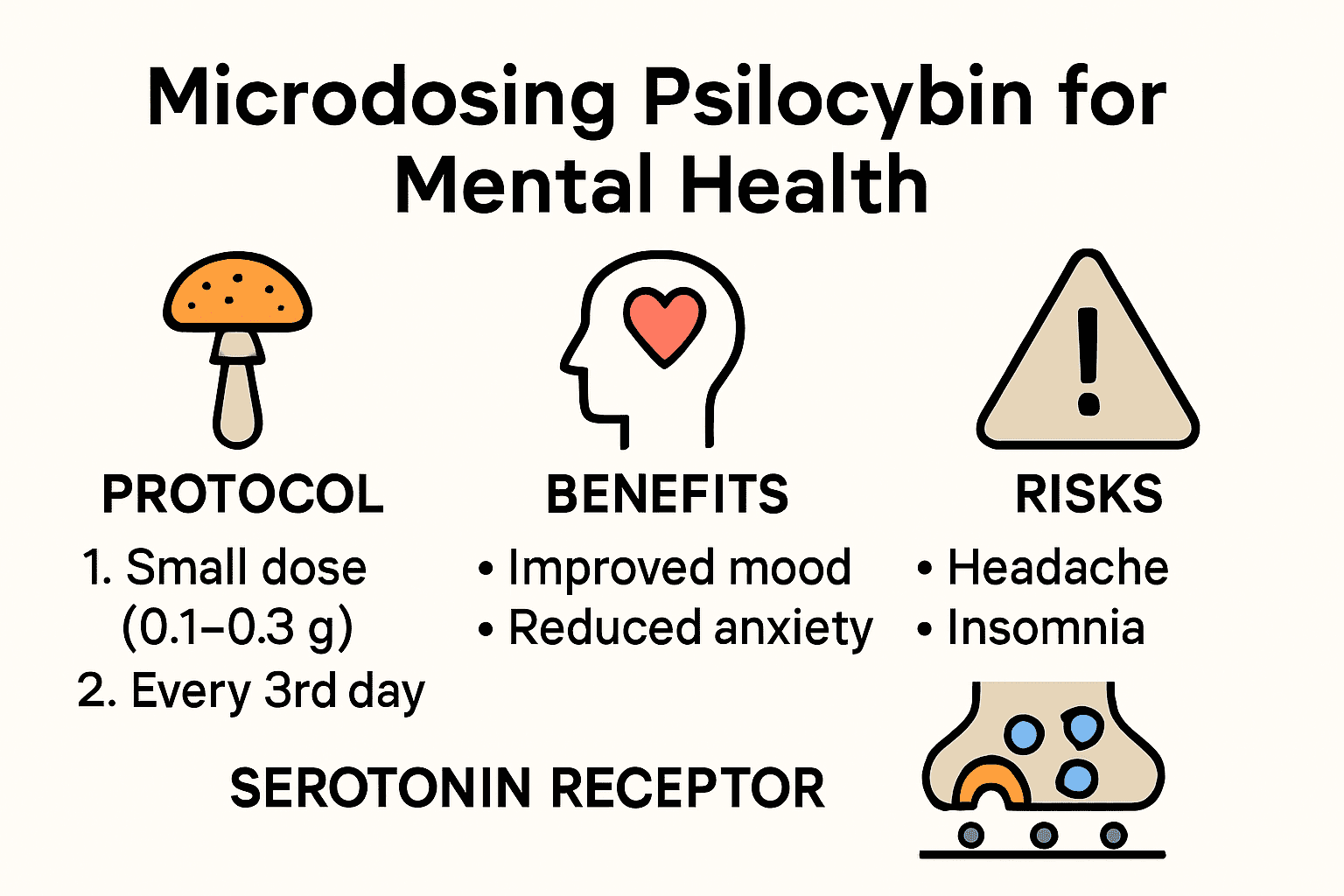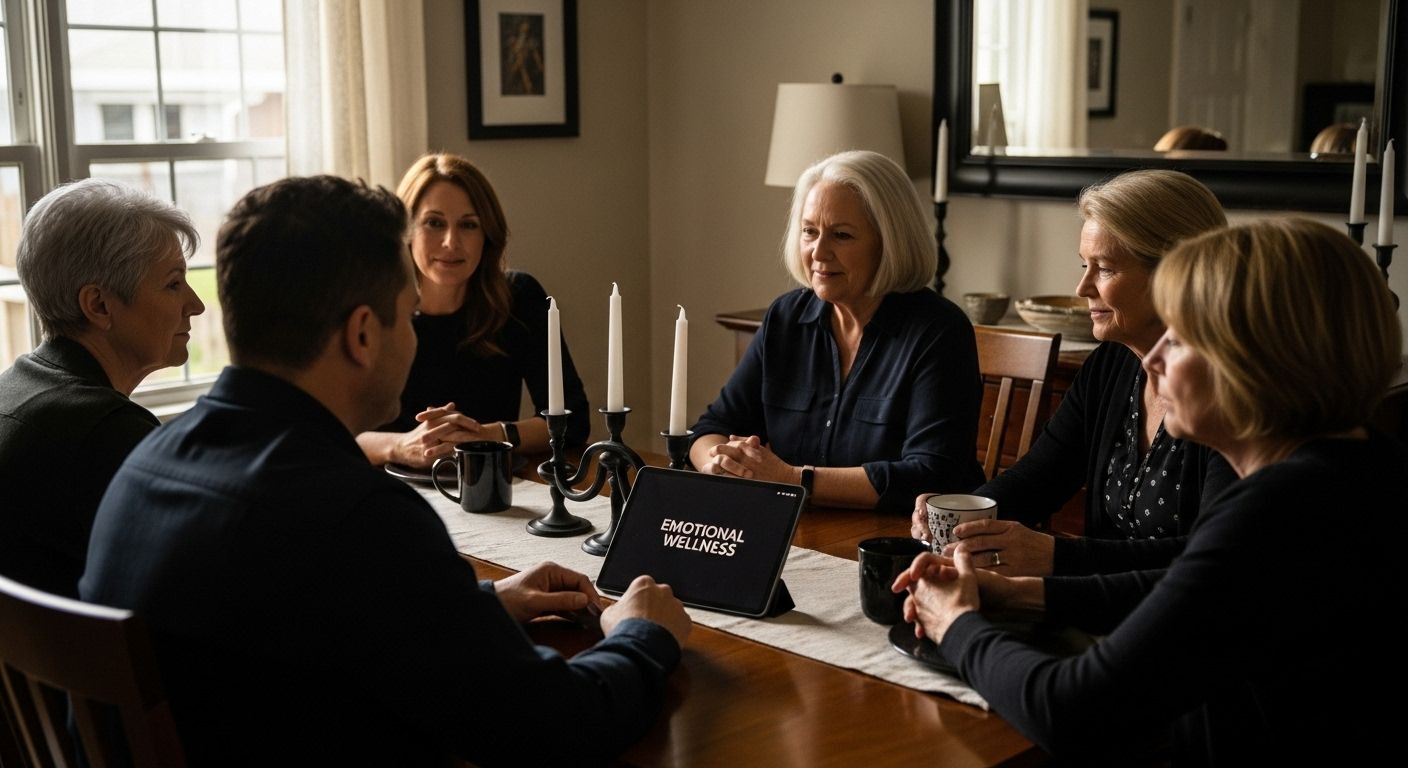Psilocybin is gaining serious attention for its role in mental health, with studies showing it may significantly reduce PTSD symptoms and even help people achieve long-term remission. Most people assume psychedelics just cause mind-bending trips or risky behavior. The real surprise is that when used in small, controlled doses under professional care, psilocybin can support emotional recovery where other treatments have failed.
Table of Contents
- Understanding Psilocybin And Its Effects On PTSD
- Microdosing Psilocybin For Emotional Wellness
- Legal And Safe Access To Psilocybin In Canada
- Buying Psilocybin And Microdose Mushrooms Online
Quick Summary
| Takeaway | Explanation |
|---|---|
| Psilocybin may treat PTSD effectively | This compound interacts with serotonin receptors, promoting neuroplasticity and helping to process traumatic memories. |
| Microdosing can improve emotional wellness | Controlled, low doses of psilocybin are associated with subtle emotional and cognitive benefits without intense hallucinogenic effects. |
| Consult professionals for psilocybin therapy | Professional guidance is crucial when considering psilocybin for mental health to ensure safety and efficacy. |
| Stay informed about legal access in Canada | Understanding current regulations is necessary for safe and lawful psilocybin use, primarily through clinical trials. |
| Approach online purchases with caution | Thorough research on vendors and products is essential to mitigate risks associated with legality and quality. |
Understanding Psilocybin and Its Effects on PTSD
Psilocybin emerges as a groundbreaking approach in addressing the complex landscape of post-traumatic stress disorder (PTSD). This naturally occurring compound found in certain mushroom species represents a potential breakthrough in mental health treatment, offering hope for individuals struggling with persistent traumatic memories and emotional dysregulation.
The Neurological Mechanisms of Psilocybin
At its core, psilocybin works by interacting with the brain’s serotonin receptors, creating a unique neurological response that can potentially rewire traumatic memory processing. Research from Ohio Northern University revealed critical insights into how psilocybin influences fear extinction mechanisms, highlighting that the compound’s therapeutic effects can vary significantly based on biological sex. This nuanced understanding suggests that personalized treatment approaches may be essential for optimal outcomes.
The compound’s ability to promote neuroplasticity represents a key mechanism in addressing PTSD. By temporarily disrupting established neural pathways, psilocybin creates an opportunity for the brain to form new connections and potentially reframe traumatic experiences. A 2024 clinical review emphasized that this neuroplastic potential could be particularly transformative for individuals who have not responded to traditional therapeutic interventions.
Therapeutic Potential and Research Insights
Current scientific investigations point to promising outcomes for psilocybin-assisted therapy in PTSD treatment. A Veterans Affairs evidence brief demonstrated that psilocybin-assisted psychotherapy may significantly reduce depression severity and potentially lead to sustained remission of symptoms. This research suggests that the compound goes beyond traditional treatment modalities, offering a holistic approach to mental health recovery.
The therapeutic process typically involves controlled, supervised sessions where individuals can explore their traumatic memories in a supportive environment. Unlike traditional pharmaceutical treatments that often mask symptoms, psilocybin appears to facilitate deeper psychological processing and emotional integration. Learn more about how psilocybin supports mental wellness through its unique neurological interactions.
While the research remains promising, researchers emphasize the importance of structured, professional guidance during psilocybin therapy. The compound is not a standalone cure but a potentially powerful tool when integrated with comprehensive mental health support. Ongoing clinical trials continue to explore its efficacy, safety protocols, and long-term implications for PTSD treatment.
Individuals considering this approach should consult mental health professionals and understand that psilocybin therapy represents an emerging field with complex considerations. The journey towards healing is deeply personal, and what works for one individual may differ for another. Continued research and personalized treatment strategies will be crucial in fully understanding psilocybin’s role in mental health recovery.
Microdosing Psilocybin for Emotional Wellness
Research is uncovering fascinating insights into how microdosing might support emotional regulation and mental resilience. A comprehensive study in the Journal of Psychopharmacology highlights emerging evidence suggesting that microdosing may contribute to reduced symptoms of depression, anxiety, and potentially PTSD. The key distinction lies in the dosage approach, which aims to create minimal but meaningful neurological shifts without overwhelming psychological experiences.
The neurological mechanisms behind microdosing involve subtle interactions with serotonin receptors, potentially promoting neuroplasticity and emotional flexibility. By introducing minute quantities of psilocybin, individuals might experience enhanced mood stability, improved emotional processing, and increased cognitive adaptability. Explore more about how psilocybin interacts with brain function to understand these intricate neurological pathways.
The Science of Subtle Neurological Transformation

Microdosing is not a universal solution but a personalized approach to emotional wellness. Individuals report varied experiences, ranging from subtle mood improvements to enhanced creative thinking and emotional resilience. The practice requires careful, intentional implementation, often accompanied by mindfulness practices, therapeutic support, and consistent self-reflection.
Professional guidance remains crucial in developing a responsible microdosing protocol. This involves understanding individual physiological responses, establishing appropriate dosage schedules, and creating a supportive environment for emotional exploration. Some practitioners recommend structured protocols like the Fadiman method, which involves consuming microdoses every third day to minimize potential tolerance and maintain neurological sensitivity.
While promising, microdosing research is still in its early stages. Current evidence suggests potential benefits, but long-term comprehensive studies are necessary to fully understand its implications. Individuals considering this approach should prioritize consultation with mental health professionals, maintain realistic expectations, and approach the practice with thoughtful, informed consideration.
Emotional wellness through microdosing is not about dramatic transformations but subtle, incremental improvements in mental landscape. It represents a nuanced approach to mental health that recognizes the complexity of human emotional experiences and the potential for gentle, supportive interventions.
Legal and Safe Access to Psilocybin in Canada
Navigating the legal landscape of psilocybin access in Canada represents a complex and evolving journey for individuals seeking alternative mental health treatments. While interest in psilocybin’s therapeutic potential continues to grow, current regulations require careful understanding and strategic approaches to ensure safe, legal engagement.
Current Regulatory Framework
Health Canada currently acknowledges ongoing research into psilocybin’s potential for treating mental health disorders, including PTSD. The primary legal pathways for accessing psilocybin remain limited, primarily restricted to clinical trials and exceptional Section 56(1) exemptions under the Controlled Drugs and Substances Act. This cautious approach reflects the government’s commitment to patient safety and rigorous scientific evaluation.
In a significant development, the Canadian government invested nearly $3 million in clinical trials exploring psilocybin-assisted psychotherapy. These studies aim to comprehensively assess the safety and efficacy of psilocybin in treating conditions like treatment-resistant depression and end-of-life psychological distress. Learn more about the legal nuances of psilocybin in Canada to stay informed about these evolving regulations.
Therapeutic Access and Research Pathways
For individuals interested in psilocybin-assisted therapy, several structured pathways exist. The most prominent route involves participating in authorized clinical research programs. In November 2022, the Senate Subcommittee on Veterans Affairs highlighted the promising potential of psilocybin-assisted therapy, particularly for veterans experiencing treatment-resistant PTSD. This governmental recognition signals a growing openness to exploring alternative mental health interventions.
Specialized medical practitioners can apply for Section 56(1) exemptions, which allow controlled, supervised use of psilocybin in specific therapeutic contexts. These exemptions require comprehensive documentation, demonstrating a clear medical necessity and a structured treatment protocol. Patients must work closely with healthcare professionals who understand the intricate legal and medical considerations surrounding psilocybin therapy.
The emerging legal landscape suggests a gradual shift towards more comprehensive acceptance of psilocybin’s therapeutic potential. However, individuals must approach access with patience, thorough research, and professional guidance. The current regulatory environment prioritizes scientific rigor, patient safety, and controlled exploration of psilocybin’s medical applications.
As research continues to unveil the compound’s potential, legal frameworks are likely to evolve. Prospective users should stay informed about changes in regulations, participate in ongoing research when possible, and maintain open communication with healthcare providers. The journey towards mainstream acceptance of psilocybin as a therapeutic tool requires continued scientific investigation, responsible use, and a nuanced understanding of its potential benefits and limitations.
Below is a summary table outlining the main legal pathways for accessing psilocybin in Canada, as described in this section:
| Legal Pathway | Description | Requirements |
|---|---|---|
| Clinical Trials | Participation in authorized research studying psilocybin’s efficacy and safety | Enroll in research program; meet inclusion criteria |
| Section 56(1) Exemption | Exemption under the Controlled Drugs and Substances Act for specific therapeutic need | Medical necessity; physician application and protocol |
| Government-Backed Research Funding | Funding for clinical studies to evaluate psychotherapy benefits for mental health | Involvement as trial participant or investigator |
| Not Legally Accessible Otherwise | General public use or purchase remains prohibited; no over-the-counter legal access | Not applicable |
Buying Psilocybin and Microdose Mushrooms Online
Purchasing psilocybin and microdose mushrooms online requires careful navigation of complex legal, safety, and ethical considerations. As interest in alternative mental health solutions grows, consumers must approach online purchasing with informed caution and a comprehensive understanding of potential risks and regulatory landscapes.
Understanding Online Purchasing Risks and Regulations
Harvard Health emphasizes the critical need for scientific evidence and medical supervision when considering microdosing psychedelics. The current online marketplace presents significant challenges, with limited scientific validation of safety and efficacy. Potential buyers must recognize that decriminalization efforts do not automatically translate to safe, unregulated consumption.
The legal landscape surrounding psilocybin remains intricate and varies widely. Research indicates a complex regulatory environment where different jurisdictions maintain distinct approaches to psilocybin access. Some regions have begun decriminalization processes, while others maintain strict prohibition. Discover comprehensive insights about current psilocybin regulations to make informed decisions.
Safe Online Purchasing Strategies
Responsible online purchasing of microdose mushrooms demands several critical considerations. Consumers should prioritize vendors who provide transparent sourcing information, third-party laboratory testing results, and clear dosage guidelines. Reputable providers will offer comprehensive documentation about product composition, potential interactions, and recommended usage protocols.
Before making any online purchase, individuals must conduct thorough research about the specific product, its potential effects, and legal implications in their jurisdiction. This involves consulting healthcare professionals, understanding personal medical history, and assessing individual risk factors. Microdosing is not a one-size-fits-all solution and requires personalized, informed approach.
Potential buyers should be aware that online purchases carry inherent risks. These include potential legal consequences, product quality inconsistencies, and the absence of medical supervision. The emerging market for psilocybin products necessitates a cautious, well-researched approach that prioritizes personal safety and scientific understanding.
Additionally, consumers must recognize that online purchasing does not substitute professional medical advice. Psilocybin and microdose mushrooms should be considered as potential complementary approaches to mental health treatment, not as standalone solutions. Ongoing communication with healthcare providers remains crucial in developing a comprehensive, safe mental wellness strategy.
As research continues to evolve, the landscape of online psilocybin purchasing will undoubtedly transform. Staying informed, maintaining a critical perspective, and prioritizing personal health and legal compliance are essential strategies for individuals exploring this emerging field of alternative mental health support.

To help clarify the key safety and research steps recommended before purchasing psilocybin or microdose mushrooms online, here’s a checklist-style table based on the guidance in the content:
| Step | Recommended? | Notes |
|---|---|---|
| Research legal status in your jurisdiction | Yes | Regulations and laws vary; ensure local compliance |
| Consult with a healthcare professional | Yes | Assess personal health risks and get tailored advice |
| Check for third-party lab testing and sourcing | Yes | Ensures product quality and safety |
| Review vendor transparency (composition, dosage) | Yes | Look for vendors who openly disclose ingredient details and usage instructions |
| Evaluate risks and product quality | Yes | Consider inconsistent quality, potential contamination, and lack of quality control online |
| Use as a standalone solution without guidance | No | Medical supervision recommended; not a substitute for professional mental health treatment |
Frequently Asked Questions
What is psilocybin and how does it help with PTSD?
Psilocybin is a naturally occurring compound found in certain mushrooms, known for its psychoactive effects. When used under professional supervision, it interacts with serotonin receptors in the brain, promoting neuroplasticity and potentially assisting individuals in processing traumatic memories related to PTSD.
How does microdosing psilocybin differ from traditional psychedelic therapy?
Microdosing involves taking sub-threshold doses of psilocybin to achieve subtle emotional and cognitive benefits without the intense hallucinogenic effects. In contrast, traditional psychedelic therapy utilizes higher doses during supervised sessions to facilitate deeper exploration of traumatic experiences.
What are the potential risks associated with psilocybin use for PTSD treatment?
While psilocybin shows promise in treating PTSD, risks can include psychological distress if not used in a controlled environment, potential for adverse reactions, and legal implications depending on jurisdiction. Consulting with a healthcare professional is crucial for minimizing these risks.
Are there any legal pathways to access psilocybin for therapeutic use in Canada?
Yes, in Canada, individuals can access psilocybin through structured pathways such as participating in authorized clinical trials or obtaining a Section 56(1) exemption, which allows for the supervised use of psilocybin under specific conditions for therapeutic purposes.
Reimagine Your Journey to Stability and Emotional Wellness
If you find yourself struggling with persistent stress, emotional instability, or the ongoing effects of trauma, you are not alone. As discussed in “Psilocybin and PTSD: Natural Support for Mental Health 2025,” traditional paths to healing do not always provide the relief you are searching for. Many in the Kind Stranger community have explored how microdosed psilocybin can support emotional regulation, mental clarity, and gentle neurological transformation while keeping your daily life on track.

Ready to move from research to real solutions? At Kind Stranger, you will find carefully formulated microdosed psilocybin capsules and gummies, complete with educational resources and harm-reduction guidance for Canadian consumers. Explore our detailed FAQs on dosing and legality and learn how to use microdosing safely for emotional balance. Take your first step toward a more resilient mindset and discover how plant-based support can fit into your mental wellness strategy today. Visit Kind Stranger online and begin your journey with clarity and confidence.


Comments
There are no comments yet.